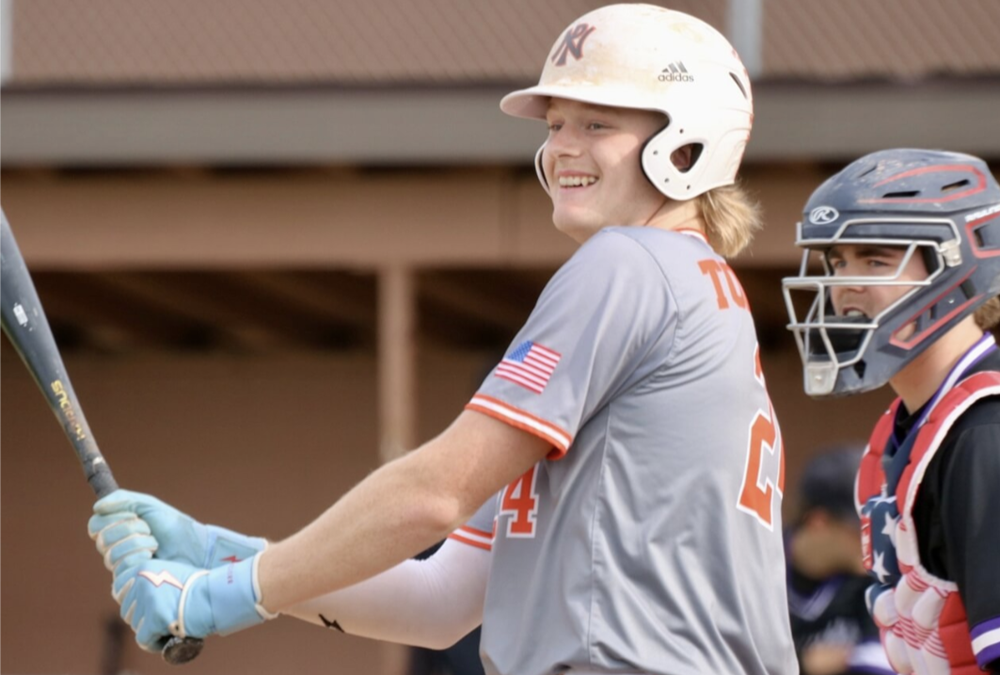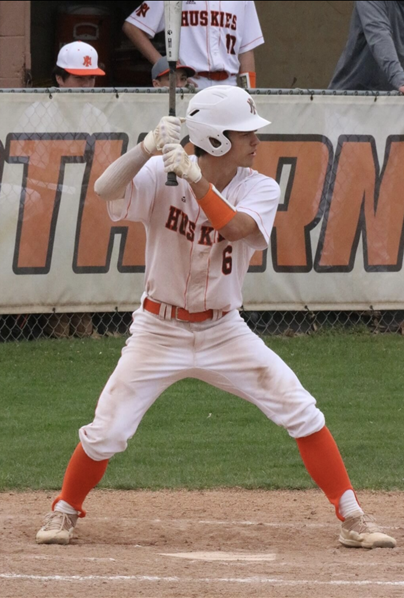
Powerful Voice for High School Sports
December 19, 2014
By Geoff Kimmerly
Second Half editor
Paul Carey was home from the U.S. Army only a few months and just shy of 25 years old when Beal City embarked on its first trip deep into the MHSAA boys basketball tournament.
On the call for local radio station WCEN from gyms at Saginaw Arthur Hill and Lansing Sexton, Carey served as the voice of the previously “laughable” Aggies as they reached the Class D Semifinals before falling just six points short of playing for the title.
“All of Beal City emptied out. They’d never had anything before,” Carey recalled during his annual Thanksgiving weekend visit to the MHSAA Football Finals at Ford Field. “When I got home, within the next two weeks I got a letter from every citizen of Beal City thanking me for broadcasting their games. That’s the kind of appreciation that meant so much.”
During 42 years on the airwaves, Carey was best known as a voice of the Detroit Tigers bounding out of transistor radios all over Michigan, thanks to WJR’s powerful signal.
But for the state’s high school sports community, his legacy is similarly memorable as the voice of the longtime football and basketball scoreboard show and a voter for various all-state teams and wire polls over the decades.
Now 86 and retired since 1991, Carey remains a regular during the first day of the Football Finals, taking in games he broadcast for the MHSAA during the late 1970s and that continue to hold his eye as they have for more than a half-century.
“It was a passion of mine. High school sports always has been,” Carey said. “I think because my dad was a high school coach, and teacher initially, and my brother was a high school coach and teacher, I just grew up in families that appreciated coaching and athletics. I was not a great athlete, but it kept my hand in following sports that way.”
Now, the scores
Carey partnered with Ernie Harwell for Tigers radio broadcasts from 1973-91, including during the march to the 1984 World Series championship. He was named Michigan Sportscaster of the Year six times and to the Michigan Sports Hall of Fame in 1992.
But Carey’s early career included sitting on top of a car, plugged into a phone pole, for a Sacred Heart football game at old Fancher Field just a few blocks from his family’s Mount Pleasant home. Among many more accolades are a Distinguished Service Award from the Michigan High School Coaches Association and a place in the Basketball Coaches Association of Michigan Hall of Fame.
In fact, the start of his weekly announcing of statewide football and basketball scores preceded his baseball career by 16 years and ended two months after he announced his final professional out.
The Michigan High School Scoreboard show was a staple of WJR’s late Friday nights from 1957-91. Carey would read every score he could collect from a variety of sources, often organized by league and with state rankings and context mixed in.
His idea came from something similar read by Len Colby for Kalamazoo’s WKZO. Carey’s brother Terry was coaching at Niles during the second half of the 1950s, and he and other coaches would get together to listen to the Friday night scores from the southwestern part of the state.
Carey, who left WKNX in Saginaw for WJR in 1956, explained to then-sports director Bob Reynolds that the station’s strong signal could provide for a truly statewide scoreboard experience.
Carey then connected with Edgar Hayes of the former Detroit Times, who gave the OK for Carey to call the paper on Friday nights to get scores from the Detroit metro area. For the rest, Carey relied on wire services – there were three at the time – who relied on newspapers from all over Michigan to call in scores over the course of an evening.
Before every Friday during high school football season – and later Tuesdays and Fridays during boys basketball season – Carey typed up lists of games based on schedules in the newspaper, with spaces to add scores. More than a few times, Carey raced down a back ramp at Tiger Stadium after a Friday night game, back to the WJR studio, with 15 minutes to prep for the show’s 11:30 p.m. start.
“If the Flint Journal, the Grand Rapids Press, the Traverse City paper didn’t call in scores to the AP, then I was out of luck too. And that happened all the time,” Carey said. “I would call back occasionally, say, ‘Did you get anything more?’ It was a rat race.”
The show originally was set for 10 minutes and then extended to 15. American Airlines sponsored a record show that followed, and Carey’s scoreboard show had a sponsor only once in 35 years. Finishing up on time was expected, even with more than 200 scores to read.
But Carey said he always went 20 minutes, sometimes 25.
“Because I wasn’t done. I just kept right on going,” Carey said. “Jay Roberts did the all-night show most of the time, and he was patient with me. He didn’t say too much on the air about ‘that guy ahead of me took all of my time.’”
Carey continued the “rat race” until his final scoreboard show, Dec. 20, 1991. He retired from WJR at the end of that calendar year. And it's important to note: Carey was never paid a dime extra for doing the program. .
“I think Paul is really just a sports fan, and that came across to the listener on his broadcasts,” MHSAA historian Ron Pesch said. “Paul would gather as much as possible off the wire. He'd interject if scores were missing from sections of the state. Press polls from the Free Press, News, AP and UPI were big, so he could point out close calls and upsets.
“He provided immediacy, or the closest thing to it in the days before cable TV and the Internet, and because of his scoreboard show, you could get the results before the morning paper. For listeners, he brought life to something as simple as game scores.”
First team all the way
Carey, who resides in Rochester, also served as the engineer on Tigers broadcasts for 16 years, through 1990. He broadcast Pistons games on the radio for six seasons and did the first broadcast of a Central Michigan University football game, in 1949.
Harry Atkins, covering Detroit’s teams while with The Associated Press for 29 years including the last 21 as its sports editor for Detroit, took note of his colleague's hard work – and especially that Carey was one of few broadcasters who was a journalist in addition to a voice.
That made Carey's other major role in high school sports a natural fit.
Atkins split The Associated Press all-state selection panels for football and basketball into 11 regions, and Carey represented the Detroit area for a number of years. He also was a longtime voter in those sports' weekly polls.
“Paul is just that kind of guy. He thought it was important and he made time in his busy schedule to do it,” Atkins said “And it had an impact on the other 10 voters on the All-State panels, too.
“Some of them were from small out-state newspapers or radio or TV stations. Yet every one of them knew who Paul Carey was. And when he spoke, of course, with what often is called "The Voice of God," those voters paid attention.”
And he still does, as well.
At the end of each fall, Carey still puts together a compilation of the three high school all-state football teams – Associated Press, Detroit Free Press and Detroit News – and files them with years of research and results.
“It’s important to me. Nobody sees it but me, but I get a certain kick,” Carey said. “Once in a while I’ll see a kid playing at Central, Western or (Michigan) State or Michigan, and they’ll say he came from Clawson. I’ll go into my all-state collections, say that would’ve been 2009 he played, and I find a name.”
In addition to the Football Finals on WJR, Carey was part of the Baseball Finals broadcasts into the early 1990s, continuing to contribute even after his retirement from his fulltime gig.
He spent high school games over the years sitting next to legends like the Free Press’ Hal Schram and remembers when current Free Press longtime scribe Mick McCabe was just a rookie. One of Carey's final broadcasts was a 1992 Baseball Final with his nephew Mike Carey, who continues to broadcast MHSAA championship games to this day.
“I am eternally grateful to Paul Carey. His contribution to high school sports in Michigan has been great and significant,” Atkins said.
“We are lucky to have him.”
PHOTO: Paul Carey (left) and nephew Mike Carey broadcast the MHSAA 1992 Class D Baseball Final between Hillman and Athens for PASS.

Healthy Tomlinson Gives Portage Northern Major Reason to Dream Big
By
Pam Shebest
Special for MHSAA.com
May 14, 2024
PORTAGE – Ty Tomlinson ended last season as a member of the Michigan High School Baseball Coaches Association all-state Dream Team.
 This season began as more of a nightmare for the Portage Northern senior.
This season began as more of a nightmare for the Portage Northern senior.
The lanky shortstop stepped up to the plate for his second at-bat of the Huskies’ opening game and started legging out a double.
“On my way to first base, my first step out of the box, I heard a nice little pop,” Tomlinson said. “Coach (Ben) Neal was screaming at me because he thought I wasn’t hustling. Turns out I was just barely making it to the base.”
That’s because the “pop” was a hamstring injury that sidelined him for nearly half the team's games so far.
“It was rough,” the senior said. “Definitely not how I wanted to start my year. I played three years without getting hurt, and to start the year off like that, especially after all the work we put in this off-season, I was really excited to see it pan out.”
His dad, Ryan Tomlinson, said he knew right away what happened.
“I saw it,” he said. “I knew what happened without talking to him. He’s a very competitive kid.”
Ryan Tomlinson is no stranger to seeing injuries. After 20 years, he recently retired as Western Michigan University’s women’s tennis coach. The first thing he did after Ty’s injury was set his son up with a trainer.
 “Ty would get up at 6 a.m. to work with my trainer, then go to school, then come home to work in the training room,” Ryan said.
“Ty would get up at 6 a.m. to work with my trainer, then go to school, then come home to work in the training room,” Ryan said.
The injury kept the shortstop out of the game, but not out of the action.
“It was hard on a personal level because I’ve grown up as a competitor, but we have so much depth,” Tomlinson said. “I did a lot of the pitch charting, so I was in the game every pitch. As much as I hated being away, we still played great.”
While Tomlinson was sidelined, senior second baseman Ryan Juodawlkis lost his infield partner.
“Me and Ty, we’ve been a duo for years,” Juodawlkis said. “We have great chemistry.
“We’ve played together a long time. We grew up together playing ball since 11-U. We’ve always been on the field together, talking to each other and communicating.”
With Tomlinson out, Brice Welke, one of two sophomores on the team, stepped in at shortstop.
“It’s always harder to adjust to someone else, especially a younger guy,” Juodawlkis said. “It’s the communicating, who’s got the bag for a steal, who’s gonna hold a runner on.”
Prepping to contend
When the schedule comes out at the beginning of the season, the first two dates the Huskies circle are against Mattawan and Portage Central, Tomlinson said.
Central is the crosstown rival with players who are friends outside of school, and Mattawan is the team that ended Northern’s last two seasons in Division I District Finals.
 Northern, ranked No. 15 in Division 1 this spring, was to take a 16-5 record against eighth-ranked Mattawan into a contest scheduled for last Thursday. But the devastation from the EF2 category tornado two days earlier resulted in school being canceled for three days, postponing the game.
Northern, ranked No. 15 in Division 1 this spring, was to take a 16-5 record against eighth-ranked Mattawan into a contest scheduled for last Thursday. But the devastation from the EF2 category tornado two days earlier resulted in school being canceled for three days, postponing the game.
“They know they still get to play, so they’re not too heartbroken about (postponing the game),” second-year head coach Adam Cardona said. “A few have been without power a few days, no one lost their homes, but some of their families have been affected, which I know is weighing on them a bit. Praise the Lord, everybody is safe.
“With everything that’s going on, I think they understand it puts baseball in perspective; there’s bigger things than baseball. I think they’re ready to get back into it and get some of that normalcy back.”
Games against Mattawan and Portage Central, especially, are a good indication of the Huskies' playoff potential.
“Our pitchers need to throw strikes and provide weak contact,” Juodawlkis noted as keys to making it past Districts. “Don’t try to do too much and put the ball in play.”
Senior catcher Braden Welke added, “It’s going to take better situational hitting and a lot better moving runners over (to advance).”
Baseball is in the Welkes’ DNA.
Their father Ben played college ball, and their grandfather Tim Welke, as well as a great uncle, Bill, are former MLB umpires.
 While their grandfather is at most games, he doesn’t try to “umpire” them.
While their grandfather is at most games, he doesn’t try to “umpire” them.
“He more just talks and chats with the umpires. Both give me plenty of stories and pointers,” Braden Welke laughed.
Cardona said Welke is one of the best catchers in Southwest Michigan.
“That dude just loves the game of baseball,” Cardona said. “He’s happy to be out here every single day.
“Behind the dish, he calls everything. He sees the game and knows the game well.”
Welke said he likes being in control.
“I like being able to touch the ball every single play,” he said. “You’re always in the play, always talking. You’re kind of the leader on the field.”
Other seniors on the team are Maxwell Pidgeon, Jack Mick, Antonio Parsayar, Keegan McIntyre and Danny Tafoya. Juniors are Nolan Ratliff, Seth Bartlam, Drew Clyne, Thomas Horein, Mateo Icaza, Izaak Bobbio, Finn Malek, Nolan Wilson, Andrew Wagster, Braden Hembree, Mason Wesaw, David Li and Evan Elkins. Evan McIntyre is the other sophomore.
Diehard fans
While his dad played and coached tennis, Ty Tomlinson knew at an early age it was not for him.
“I grew up playing tennis along with baseball and other sports, trying other sports out,” he said. “Tennis was just not for me.
“I was not the fleetest of foot back in my day, so I couldn’t move around the court all too well,” he laughed. “Dad and I would kind of butt heads a little bit, so I was ‘I’ve got to move on.’”
Ryan Tomlinson is a huge Detroit Tigers fan.
So huge, that his three sons’ names are all derived from former Tigers greats including two Hall of Famers.
Ty is named for Ty Cobb, while his 11-year-old brother is Graydon Gibson (from Kirk Gibson) and his 7-year-old bother is Myles Kaline (Al Kaline).
However, the two younger Tomlinsons are finding their niche in hockey right now.
Ty Tomlinson originally committed to play baseball at University of Michigan next season. But after feeling he found a better fit at George Mason University in Fairfax, Va., the shortstop de-committed and opted to head south to play for the Division I Atlantic 10 Patriots.
“Plus it’s warmer,” he laughed. “I’m not a fan of the cold, and apparently neither is my hamstring.”
 Pam Shebest served as a sportswriter at the Kalamazoo Gazette from 1985-2009 after 11 years part-time with the Gazette while teaching French and English at White Pigeon High School. She can be reached at [email protected] with story ideas for Calhoun, Kalamazoo and Van Buren counties.
Pam Shebest served as a sportswriter at the Kalamazoo Gazette from 1985-2009 after 11 years part-time with the Gazette while teaching French and English at White Pigeon High School. She can be reached at [email protected] with story ideas for Calhoun, Kalamazoo and Van Buren counties.
PHOTOS (Top) Portage Northern’s Ty Tomlinson smiles during an at bat. (2) Ryan Juodawlkis stands in for a pitch. (3) Huskies coach Adam Cardona. (4) Catcher Braden Welke puts on his equipment. (Action photos courtesy of the Portage Northern baseball program; head shot by Pam Shebest.)

